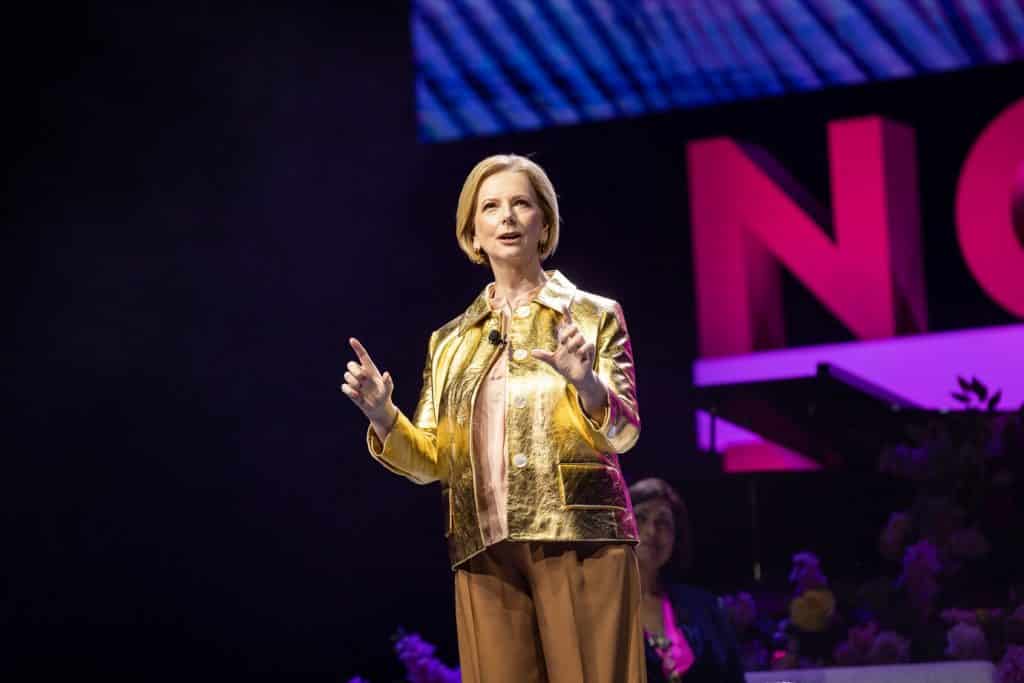Enroute to Julia Gillard’s Not Now Not Ever event in Sydney, I didn’t know what to expect. I certainly didn’t expect to find myself moved to tears within minutes of curtains up. Yet, moved to tears, I was.
The opening montage, which captures snippets of Julia Gillard’s now infamous riposte to Tony Abbott at the despatch box, weaved alongside news clippings and reports from the time, interspersed with reflections from a roll call of public figures ranging from Hillary Clinton to Kathy Lette, Anthony Albanese to Annie Lennox, was electric. I was quite unexpectedly overwhelmed with tears.
The explanation I have is simple. In just a few minutes the Not Now Not Ever montage proved time has not stood still. Despite the horror of sexism, misogyny, and harassment – then and now – things have changed. Not enough, and not fast enough, but things have changed. That, in itself, is proof that we must persist, even in the face of glacial progress. And it was enough for spontaneous weeping.
Julia Gillard stepping onto stage, resplendent in gold, to a rockstar welcome from the 5000+ strong crowd, was in itself a quantum leap from 2012. Back then, the Prime Minister was fighting to have her credibility – not her likeability – respected. She wasn’t seeking special treatment; she was seeking fair treatment.

That her misogyny speech, which immediately became a global viral hit, was initially derided as emotional and hysterical in the Australian media is telling. It is hard to fathom Julia Gillard circa 2012 receiving a standing ovation. Ten years on it’s not a stretch to describe her as an international superstar in the realm of efforts to achieve a gender-equal world. Not, it must be said, because Gillard used her prime ministership to accelerate these efforts, but because it’s become her singular focus since leaving domestic politics.
Not Now Not Ever is described as a celebration and a reflection. As a performance review marking Australia’s progress in grappling with sexism and misogyny, it’s clear, mercifully, that progress is underway. It’s hard to discount the role Julia Gillard has played.
The significance and impact of that speech is clear from the line-up of guests and speakers who Gillard assembled to mark the 10 year anniversary. Who else in Australia could command thoughtful, heartfelt and personal reflections from Hillary Clinton, Jacinda Ardern, Annie Lennox, Anthony Albanese, Nyadol Nyuon OAM, Professor Michelle Ryan, Georgie Stone OAM, Ashleigh Streeter-Jones and Shelley Ware? With exquisite performances by musical guest Kate Miller-Heidke and poet Joella Warkill to boot?

While Not Now Not Ever showcased Gillard’s speech and Gillard herself was interviewed by the host Indira Naidoo, the power of the evening lay in the voices of the phenomenal leaders who were invited to share the stage. Their courage was mesmerising. They spoke in deeply personal terms about the impact Julia Gillard’s speech had on them: on their lives, their careers, their activism, their families.
It’s difficult to imagine a more extraordinary collection of people on a single stage who, one by one, delivered magnificently unique, forceful monologues.
To consider, for a moment, the group the misogyny speech’s protagonist, Tony Abbott, might assemble on a stage to mark a similar 10 year anniversary, is to consider a very different event. A very different legacy. It is to confront a chasm that sets Australia’s first female prime minister apart.
Providing a space and a platform for women and gender diverse leaders to stand powerfully in their legitimate anger and speak their unvarnished truth about racism and bigotry as much as sexism, is in itself the defining legacy of Julia Gillard’s misogyny speech.
Her infamous riposte legitimised the well-founded anger of women and provided a blueprint for voicing it. It is still not a luxury afforded to all women which Gillard acknowledged explicitly in words and implicitly in deed. It is not safe or feasible for every woman to voice their anger and call out sexism or misogyny. It depends on the agency and power they have. The environment they’re in. The support – or not – around them.
For those who do have the power or platform to call it out, Gillard issued a rallying call. To ‘swap stoic silence with a raucous roar’ and match it with a set of demands for change. To look for ways to give a platform and voice to others. To be ‘angry, analytical and empowered’ in seeking change. To tap into the collective determination and sense of solidarity that exists among those who will not accept sexism or misogyny or racism or bigotry. Not now and not ever.
In 2012 some described Gillard as being embattled but that wasn’t how she felt that day. Empowered is how she felt. And, empowered is how thousands and thousands of Australians feel ten years on. Back in October of 2012 Julia Gillard cut something of a lonely figure on the floor of the house of representatives. The contrast in October of 2022 could not be more stark. You can now pay to watch the Not Now Not Ever stage show. If you need reminding of how far we’ve come and how much further we have to travel, I cannot recommend watching this show more. It is tear-jerking, the talent is inexplicable and the impact is galvanising.
Feature Image Credit: Daniel Boud.


